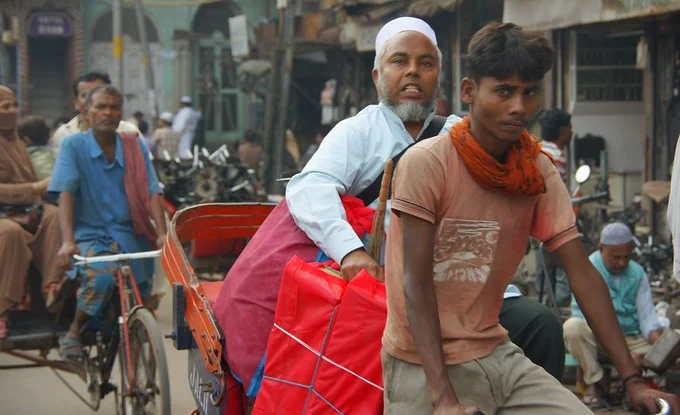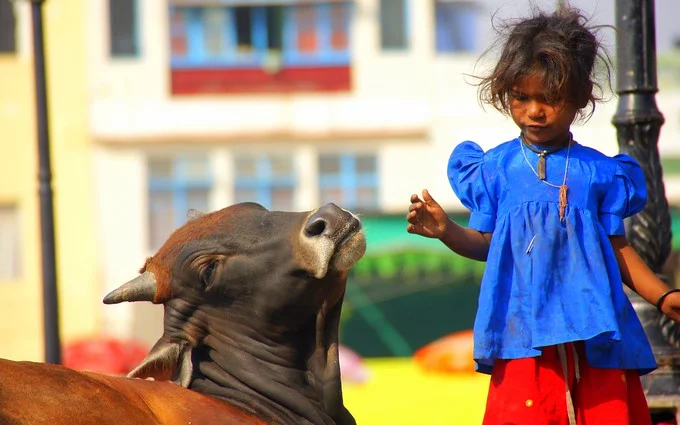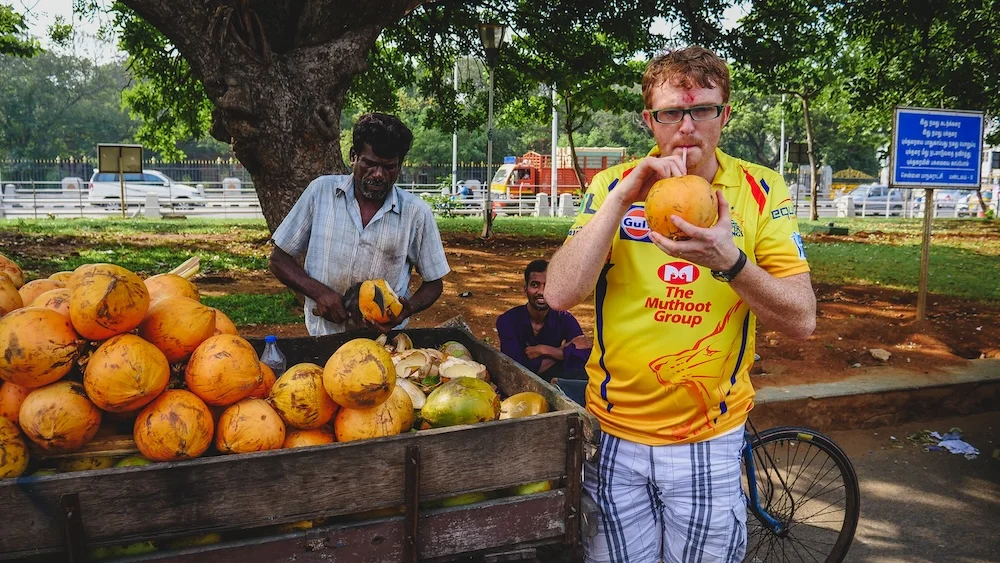Prior to landing in India, I had started to get a little road weary and ‘templed out’ revisiting a lot of familiar areas in SE Asia.
India provided the kind of stimulation – and more importantly the challenge – that I had been subconsciously craving without ever knowing it at the time. Some of these challenges proved to be extraordinary experiences while others were merely frustrating and demoralizing.
One particular aspect of traveling in India I had began to loathe was the experience of taking an auto rickshaw from point A to B.
The amount of negatively charged experiences with rickshaw drivers was really starting to mount up.
While traveling in Old Delhi I spent time visiting the impressive Jama Masjid and other surrounding areas.
I had just recently recovered enough from a horrific case of food poisoning, that had left me bedridden for several days, finally mustering up enough energy to venture around and explore Old Delhi on foot.
Overextending myself and feeling completely knackered as my body started to throb from head to toe, I realized I didn’t have the energy to make it back to the nearest subway station.
The Time I Tipped My Rickshaw Driver In India

A rickshaw driver offered me a ride back to my guest house (several kilometers away) at a price that seemed reasonable.
After agreeing on the price I hopped on and we began our journey through an endless maze of crowded markets and streets bustling to the brim with activity.
Just outside of my intended destination point the driver suddenly stopped and indicated the ride was over.
Although I insisted he take me a bit further to my guesthouse it became suddenly clear this was the end point – a location far enough away from the tourist police and other foreigners.
I reached into my pocketbook and secured the agreed upon fare for the ride.
As I motioned to hand it over to him, I couldn’t believe his reaction.
He refused it entirely crossing his hands and glaring at me with contempt in his eyes.
Dumbfounded, I gestured once again for him to receive the money but he steadfastly refused.
Suddenly he demanded I pay an exorbitant fee of four times the amount we had agreed upon.
At this point my frustration level had entered into the red zone and I simply marched over to his rickshaw and placed the money on the seat and proceeded to walk away.

I knew this was far form over.
Moments later I felt a forceful tug on my shoulder. As I pivoted I thrust back with force to push his hand off of me and allow my body to face him directly.
We glared at each other with disdain for what seemed to be eternity, but in reality was probably just several seconds.
The fine line between us exchanging blows is something that make me feel queasy even to this day.
As he finally backed off, I felt puzzled by my reaction to the entire situation.
Wouldn’t it have made more sense just to have paid the newly requested fee (the equivalent of several more dollars) to avoid escalating conflict?
Was it worth nearly getting into a violent physical confrontation over a small amount of money?
At first the answer seemed obvious – ‘NO’ – but as I further reflected I felt an increasing sense of awareness.
It wasn’t the money that was an issue. It was about being treated with respect. This wasn’t a dispute over a transaction, from my perspective, as much as it was a refusal on my part to be treated without a shred of humanity.
Although visibly and mentally shaken I felt an odd sense of pride that I had stood up for myself. I wasn’t bullied. I didn’t give in.
Opposite Experience in Udaipur, India
Several weeks later when I was visiting Udaipur I found myself in a situation where I’d be needing the services of a rickshaw driver yet again.
Absolutely dreading the situation – the haggling, hassles and persistent requests for further services – I found myself approaching the driver in a tense detached manner.

To my surprise, he quoted me a price that seemed reasonable enough not to bargain down.
As I went to secure my bag on the passenger seat I felt hands assisting me.
He took my backpack out of my hands and lifted it on top of the seat.
As we set off on our journey to the station, I started to relax a little more.
He started up a conversation in which he genuinely seemed invested in what I had to say.
As I began to realize he wasn’t trying to butter me up for additional services, I became more open and engaging with my answers.
When we finally arrived he helped lift my bag out of the rickshaw and I couldn’t help but notice the radiant smile on his face.
Before I could even put my hand in my pocket to pull out my wallet, he wished me well on my journey.
Not demanding a tip nor trying to rip me off he treated me like a valued human being – as opposed to a walking ATM machine
Without hesitation, I reached into my wallet and handed him over several bills. The tip I included was a generous one, but as much as he likely appreciated it I owed him more gratitude than he could have ever imagined.
Sometimes it’s just the little things that make a world of a difference.
The lessons I learned from this particular encounter are worth far more than the tip I gave the driver.
Ever since, I’ve become better at detaching from past experiences and treating new ones as thought they are blank slate.
I’ve learned many lessons on the road but this was one of the greatest yet.

How To Handle Being Ripped Off In India
Keep Your Cool: Don’t Let It Ruin Your Trip
Realizing you’ve been ripped off can be frustrating, but staying calm is crucial. Take a deep breath, and assess the situation before reacting. Remember, you’re in a foreign country, and it’s best to handle things with a level head. Overreacting can escalate the situation unnecessarily.
- Politely Question the Charges
Approach the person with a calm and polite demeanor. Politely ask for a breakdown of the charges or explain why you think there might be a mistake. Sometimes, a friendly conversation can resolve the issue without any further hassle. For example, if a taxi fare seems too high, ask the driver to explain the route or show the meter.
- Know When to Walk Away
If the amount involved is relatively small, it might be best to walk away. While it’s annoying, sometimes the stress of arguing over a minor overcharge isn’t worth the time or energy. Consider it part of the travel experience, and let it go. You’re here to enjoy your trip, after all.
Arm Yourself with Knowledge: Preventing Scams Before They Happen
Understanding common scams and having a general idea of local prices can save you from a lot of trouble. Before making any significant purchases or agreeing to services, do a little research. Knowing the average cost of a rickshaw ride or how much you should pay for a souvenir will help you avoid being overcharged.
- Trust Your Instincts
If something feels off, it probably is. Whether it’s a deal that seems too good to be true or a vendor who’s being overly pushy, trust your gut. Politely decline and move on if you’re uncomfortable.
Take Action: What to Do If You’ve Been Scammed
If you find yourself in a situation where you’ve been significantly ripped off, don’t hesitate to take action. Reporting the incident to the local tourist police is a good step, especially if it involves a substantial amount of money or if you feel harassed. Tourist police are typically more sympathetic to travelers and can help mediate disputes.
- Document Everything
Keep receipts, take photos, and note down names if possible. Having a record of the transaction can be helpful if you need to file a report or seek help from local authorities.
Learn and Adapt: Turn the Experience Into a Lesson
Every traveler gets scammed at some point—it’s almost a rite of passage. Use it as a learning experience. Reflect on what happened, and think about how you can avoid similar situations in the future. The next time you travel, you’ll be more prepared and confident.
- Share Your Experience
Sharing your experience with fellow travelers can be incredibly helpful. Whether it’s through online forums, social media, or face-to-face conversations, your insights can help others avoid similar pitfalls.

How To Tip For Great Service In India
Understanding the Tipping Culture
Tipping in India is customary and often expected, though it varies depending on the situation and service. While not obligatory, tipping is a way to show appreciation for good service and can significantly enhance your experience. Understanding when and how much to tip can make your interactions smoother and more pleasant.
- When to Tip: Tipping is common in restaurants, hotels, for taxi drivers, and tour guides. However, it’s less common in local eateries, small shops, and with government employees.
Restaurants and Cafés
In restaurants, tipping is typically between 5% to 10% of the total bill. In upscale establishments, a 10% tip is standard, especially if a service charge isn’t already included. For smaller, more casual eateries, leaving ₹20-₹50 or rounding up the bill is appreciated.
- Service Charge vs. Tip: Many restaurants include a service charge of around 10%, which goes directly to the staff. If you notice this charge on your bill, an additional tip is unnecessary unless the service was outstanding.
Hotels and Lodging
Tipping in hotels is expected, especially for services like baggage handling, housekeeping, and room service.
- Bellboys and Porters: For assistance with luggage, tipping ₹50-₹100 per bag is customary, with the amount varying depending on the hotel’s standard.
- Housekeeping: It’s a kind gesture to leave ₹50-₹100 per day for housekeeping, particularly if your stay is longer or if the service was exceptional.
- Room Service: For room service deliveries, a tip of ₹20-₹50 is appreciated, or more in upscale hotels.
Taxi and Auto-Rickshaw Drivers
While tipping taxi and auto-rickshaw drivers is not mandatory, it’s common to round up the fare or leave a small tip of ₹10-₹20 for a smooth ride or helpful service.
- Longer Rides and Airport Transfers: For longer journeys or airport transfers, consider tipping ₹50-₹100, particularly if the driver assists with luggage or provides additional services.
Tour Guides and Drivers
When hiring a tour guide or driver for the day, tipping is customary and expected. A tip of ₹300-₹500 for the guide and ₹200-₹400 for the driver is typical for a full-day service, depending on the quality of service and the length of the tour.
- Group Tours: If you’re part of a group tour, it’s common practice to pool tips with other travelers for the guide and driver. This approach ensures that the staff are fairly compensated.
General Tips for Tipping in India
- Carry Small Denominations: It’s helpful to carry small notes (₹10, ₹20, ₹50) to tip appropriately without the hassle of breaking large bills.
- Tip Discreetly: When tipping, it’s polite to do so discreetly, offering the tip directly to the person who provided the service.
- Know When to Tip: Tipping is appreciated in many situations, but it’s not necessary in every encounter. Use your judgment and consider the quality of service and local customs.

How To Stay Safe While Traveling In India
Stay Aware of Your Surroundings
India is a vibrant and bustling country, but with that comes the need to stay vigilant. Always be aware of your surroundings, especially in crowded areas like markets, train stations, and tourist sites. Keep your belongings secure and avoid displaying valuables like expensive jewelry or large amounts of cash.
Crowded Areas: In busy places, be mindful of your bags and pockets. Consider using a money belt or a crossbody bag with a secure zipper to keep your valuables safe.
Trust Your Instincts: If something feels off, trust your gut and remove yourself from the situation. It’s better to be cautious than regretful.
Plan Your Transport Wisely
Transportation is essential when traveling in India, but it’s important to choose reliable options and stay safe while on the move. Use trusted services, such as pre-booked taxis or ride-sharing apps, especially when traveling late at night.
- Public Transport: When using public transport like buses or trains, keep your bags close and be mindful of pickpockets. If traveling long distances by train, consider booking first-class tickets for more security and comfort.
- Local Taxis and Rickshaws: Always negotiate the fare before getting into a taxi or auto-rickshaw, or ensure the driver uses the meter. For added safety, take a photo of the vehicle’s license plate before your journey begins.
Stay Informed About Local Customs
Understanding and respecting local customs can help you avoid unnecessary risks. Dress modestly, especially in rural areas and religious sites, to blend in and show respect for local culture. Being culturally aware not only shows respect but can also prevent unwanted attention.
- Cultural Sensitivity: Learn a few basic phrases in the local language. This can help you navigate interactions more smoothly and show respect for the local culture.
- Religious Sites: When visiting temples, mosques, or other religious sites, follow the dress code and be mindful of customs, such as removing your shoes before entering.
Health Precautions
Staying healthy is key to enjoying your trip. India’s climate and cuisine can be different from what you’re used to, so take precautions to avoid common health issues like traveler’s diarrhea or heat exhaustion.
- Stay Hydrated: Drink bottled water and avoid ice in your drinks unless you’re sure it’s made from purified water. Carry rehydration salts if you’re planning to spend a lot of time outdoors.
- Eat Wisely: Enjoy the local food, but be cautious with street food if you have a sensitive stomach. Opt for freshly cooked dishes and avoid raw vegetables or fruits that you haven’t peeled yourself.
Stay Connected
Keep your family and friends informed about your travel plans. Share your itinerary, and check in regularly to let them know you’re safe.
- Mobile Connectivity: Consider getting a local SIM card to stay connected, especially if you’re traveling to remote areas. It’s also helpful to have access to maps and translation apps.
- Emergency Contacts: Keep a list of important contacts, including local emergency services, your country’s embassy, and any local contacts you may have.
